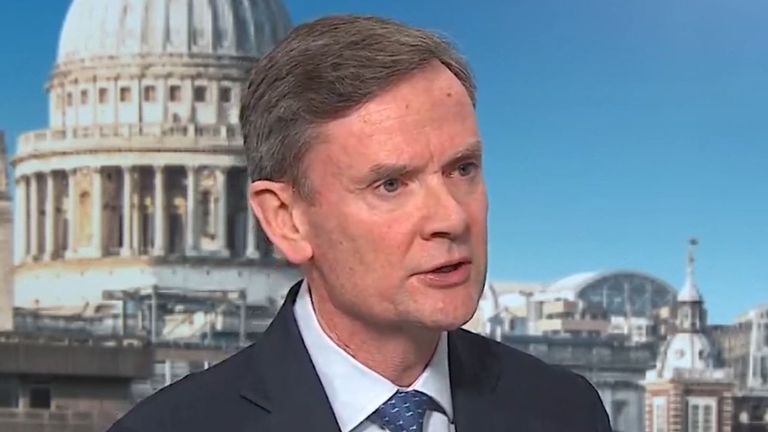St James’s Place put in its place by investors as action on fee conduct bites


How many pairs of cufflinks could £1bn buy?
That was the question being asked by City wags after that sum of money was wiped from the stock market value of St James’s Place (SJP) this morning.
It was a knowing reference to the most famous of the gifts with which the UK’s biggest wealth manager used to reward its most successful advisers that came to light in a Sunday Times expose back in 2017.
The paper revealed that SJP’s best-performing advisers were benefiting from what the paper referred to as a “cruises-and-cufflinks bonus scheme” – with a key perk being cufflinks, in the shape of SJP’s old winged lion logo, coming in colours going from blue to green to gold depending on how far in the business an individual got.
Money latest: Tax cuts and child benefit change – budget speculation
An anonymous adviser told the paper: “It’s a real status symbol among advisers and something we all prided ourselves on. Principal partners can get 18-carat white gold, diamond-encrusted cufflinks worth about £1,200.”
The rewards were among lavish accoutrements that the best SJP advisers could expect if they hit their targets.
There were lavish cruises and holidays to luxury destinations and the famous conferences, at venues like the Royal Albert Hall, where TV presenters such as Fiona Bruce or Jonathan Ross would introduce guest speakers like David Beckham or Bill Clinton.
It all came to an end when the former chief executive Andrew Croft, realising the damage the revelations had done to the company’s reputation, pulled the plug on the scheme in 2019.
Advertisement
Insisting that they had not led to the mis-selling of financial products, he told The Times: “It’s a bit more than an irritation. It’s a frustration. It’s not reflecting the company we are.”
And yet today’s gags – after shares of SJP fell by as much as 32% at one point to reach a level last seen in January 2013 – show how hard it can be to shift impressions.
That is why an even greater reset was called for. It has fallen to Mark FitzPatrick, a former interim chief executive and chief financial officer of the insurance giant Prudential, who succeeded Mr Croft at the beginning of October last year.
Central to changing those impressions and assumptions was a decision Mr FitzPatrick took just three weeks later.
He announced that the company, which manages £168.2bn on behalf of 958,000 clients, would be changing its charging structure – and reducing its fees and controversial exit charges for clients leaving the business early.
As Mr FitzPatrick put it today: “[Our] charging has too often been seen as complex and therefore open for external commentators to challenge.”
He said that, ultimately, the changes would be good for the health of the business.
Yet that simplification of fees means SJP’s profits growth will be impacted in years to come and, in turn, reduce the amount it has available to invest.
The main factor behind today’s stock price meltdown, though, was a one-off provision made by the company of £426m to compensate clients whose service has fallen short of what they might have been entitled to.
Mr FitzPatrick said: “Throughout late 2023 and early 2024 we saw a significant increase in the number of complaints, largely related to whether clients had received ongoing servicing historically. Given the scale of complaints, we needed to explore the issue by assessing client experience.
“The crux of the matter is that…in some instances the frequency of services being delivered was below what clients should have received. This means that we may need provide refunds for clients where we cannot find evidence that ongoing servicing has been provided.”
He said this was “clearly disappointing” but insisted: “We are dealing decisively with these two historic challenges.”
The matter is expected to take between two to three years to resolve and Mr Fitzpatrick said that the company was engaging “extensively” with the Financial Conduct Authority – an increasingly stern critic of opaque charging structures – on the matter.
He added: “We’ve been in extensive conversations with the FCA, we’ve had a skilled person appointed to look at elements of our book and servicing…they’ve undertaken a review of the elements of our book.
“We’ve taken the FCA through this…as is normal for this type of process.
“This has been done with their full awareness and understanding.”
He said records would need to show that an adviser had held a meeting with a client and taken notes on the meeting as evidence that the client had received the service to which they were entitled.
Mr FitzPatrick added: “If you can’t evidence it was done – it wasn’t done.”
He said that since SJP had implemented a new customer relationship management system from Salesforce, in 2021, it had a lot more evidence.
He added: “The size and scale of the issue for 2023 was that 2% of our clients had not been serviced or we didn’t have evidence of servicing. We have written out to those effected clients already…and they will be refunded over the course of this year.”
The investigation dates back to 2018 – when the statute of limitations runs for when this kind of evidence needs to have been retained. The provision meant St James’s Place reported a pre-tax loss of £4.5million for 2023 – down from a profit of £503.9m in 2022.
While the share price reaction is not altogether unexpected, a cynic might say that today’s results statement is a good example what is known in the City as a ‘kitchen sink job’ – where a company issues a set of results or a trading statement containing as much bad news as it is possible to incorporate.
In theory, it should create a base for the share price, potentially making life easier for Mr FitzPatrick in future as he seeks to prove how he is turning around the business.
So where does the company go from here?
Mr FitzPatrick insisted today he was optimistic for the future given how millions of Britons have to provide for their future and have a need for financial advice.
And he was able to point to a quite startling statistic – which is that retention rates at St James’s Place, whose client numbers have more than doubled over the last 10 years, stood at 93.5% last year.
That points to a quite remarkable level of loyalty among SJP clients in spite of the constant drip-drip of awful publicity for the company over the last seven years or so.
He also pointed out that SJP had more branches across the UK than the country’s five biggest banks. That in theory should make it easier to attract new customers.
Investors will worry about whether other nasty surprises may be waiting to come out.
But Mr FitzPatrick said: “I’ve been in the role 12 weeks. I’ve spent a long time listening, learning, looking at things – I can’t see any other significant potholes ahead of us. I’m confident with this issue being acknowledged and that we’re dealing with this – all of this puts us in a place where we can look forward with confidence. This is a historic issue as against a current issue.”
Time will tell. Mr FitzPatrick deserves credit for taking bold and decisive action. It is hard, though, to avoid the conclusion that, just three months into the job, he has already made a pledge on which he will be judged for as long as he is in it.